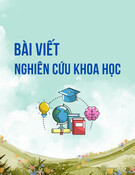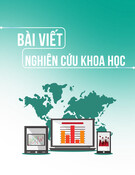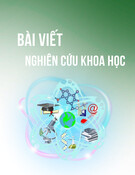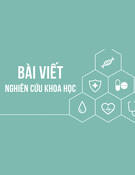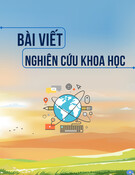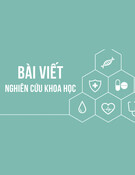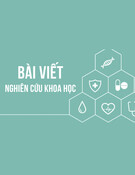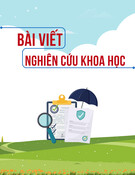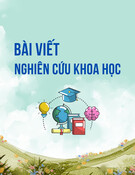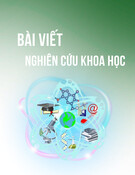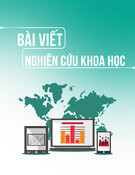
VNU Journal of Science: Education Research, Vol. 41, No. 1 (2025) 74-82
74
Original Article
Insights into Intercultural Competence
among Vietnamese Business English Majors
Le Dinh Ha My1, Tran Quoc Thao2,*
1Vietnam Aviation Academy, 104 Nguyen Van Troi, Phu Nhuan, Ho Chi Minh, Vietnam
2Ho Chi Minh City Open University, 35-37 Ho Hao Hon, Co Giang, District 1, Ho Chi Minh, Vietnam
Received 03rd June 2024
Revised 18th February 2025; Accepted 03rd March 2025
Abstract: Intercultural competence (IC) is an increasingly important topic, especially in English
language education, given the diversity of the globe today. However, in Vietnam, particularly among
Business English students, there is a lack of knowledge of IC, so this issue requires further attention and
investigation. This study aims to gain insights into the IC of Vietnamese Business English majors. The
study was conducted among 102 Business English majors through a questionnaire. With respect to data
analysis, the quantitative data was analyzed by descriptive statistics. The values of IC are related to its
sub-dimensions, intercultural attitudes, intercultural skills, and intercultural knowledge of students
pursuing Business English in Vietnam. The result indicates that the level of IC among Vietnamese
Business English was high; so were the Vietnamese Business English students’ levels of intercultural
attitudes, intercultural skills, and intercultural knowledge. More specifically, the highest level belonged
to intercultural attitudes followed by intercultural skills and intercultural knowledge. To achieve a
higher level of IC, in terms of intercultural skills, they had to analyze differences between cultures,
evaluate foreign cultural perspectives and behaviors, seek opportunities to communicate with people
from foreign cultures, adapt to new cultures flexibly, reflect when intercultural conflicts arise, and work
out solutions when misunderstandings emerge. Additionally, in terms of intercultural knowledge, they
had to acquire the knowledge of foreign cultures’ manners, their artifacts (e.g., food, money), customs,
behaviors toward foreign cultures, holidays and festivals of foreign cultures, their institutions
(e.g., education, politics), foreign literature, their beliefs, history, and core values. These results are
expected to help students increase their awareness, abilities, and understanding of IC.
Keywords: Culture, Business English majors, English language, intercultural competence.
1. Introduction *
Studies have indicated the connection
between language and culture in the foreign
language classrooms has been explored [1, 2].
_______
* Corresponding author.
E-mail address: thao.tq@ou.edu.vn
https://doi.org/10.25073/2588-1159/vnuer.5135
As rising worldwide variety, intercultural
competence (IC) is a crucial ability, particularly
in English language education. Therefore,
competencies in intercultural communication
are required in order to communicate
successfully and thoughtfully with people from
different cultural backgrounds. According to
Stewart (2007) [3], the rapid transformation of
society due to science, technology and

L. D. H. My, T. Q. Thao / VNU Journal of Science: Education Research, Vol. 41, No. 1 (2025) 74-82
75
globalization requires students to have
knowledge of other cultures.
Possessing IC will help students appreciate
and respect their international friends, as well as
foster effective management abroad. As a result
of globalization and digitization, entrepreneurs
are expected to interact with multiple languages
and cultures and be part of various communities
of practice, -in fact companies increasingly
expect employees to quickly adapt to diverse
cultures and be effective in multinational team
work [4] - thus, IC will help business students
better prepare themselves for the workplace. An
increasingly diversified market and
involvement in global business has raised the
demand for IC among business students [5].
Studies in the Vietnamese context have
confirmed and highlighted the role of cultural
teaching and intercultural education in the
current era [6, 7]. However, many educational
settings in Vietnam are made to focus heavily
on building comprehension abilities, such as
vocabulary and reading which are required to
pass the tests. Therefore, the teacher-centered
model is still used in many EFL classrooms. On
the other hand, Vietnamese teachers do not
have enough time in class to convey the need
for IC. Although universities offer some
cultural subjects, such as British and American
Cultures (Literature), these subjects are a
minority of the total number of courses that
students in EFL classes need to complete. As a
result, the focus of IC development is
frequently disregarded.
Within the research context, it is observed
that students majoring in Business English do
not pay much attention to the role of IC in their
English language learning. In addition, there is
a lack of research on the insights in IC. Once
the research paper is completed, the business
students will be reinforced about the importance
of IC. Accordingly, the students will pay more
attention to developing IC as well as applying
this competence to future careers. The purpose
of this study is to gain insights into IC among
Vietnamese Business English majors. The study
is guided by the following research question:
i) What is Vietnamese Business English
majors’ IC level?
It is expected that the initial results of this
study will contribute to the body of literature on
the relevance of IC for learning Business
English and give an understanding of IC,
revealing the attitudes of Business students
regarding IC. Furthermore, this study aims to
provide internal connections (e.g., instructors,
learners, and administrators) with a valuable
reference on the effort necessary to improve IC
in the teaching and learning of Business
English.
2. Literature Review
It can be found that the definition of IC is
defined in a number of ways by scholars [8-10].
The articles by these researchers resulted in a
consensus on the definition of IC. IC is
described as the capacity to think and behave in
culturally acceptable ways. Similarly, Johnson
et al., (2006) [9] indicate IC as an individual's
ability to successfully work with individuals
from different backgrounds and national
cultures at home as well as abroad using a
combination of knowledge, skills, and
individual qualities. In a similar vein, IC refers
to a person's capacity to interact well
throughout different cultures [10]. In this study,
IC is known as the ability to understand and
work well with others despite different cultural
backgrounds.
Depending on a wide variety of studies in
the subject matter and the different theoretical
frameworks that have been produced. In this
research, there are three specific components of
IC: attitudes, skills, and knowledge:
i) Attitudes: they are considered the basic
starting point for developing IC. Barrett (2011)
[11] believes that attitudes refer to respect,
curiosity, and openness toward people from
other cultures. In addition, attitude can be
expressed through a willingness to learn,
suspend judgment, and accept the ambiguity of
other cultures. Equally important is
appreciating cultural diversity;

L. D. H. My, T. Q. Thao / VNU Journal of Science: Education Research, Vol. 41, No. 1 (2025) 74-82
76
ii) Skills: the skills mentioned here
generally include observation (e.g., observing,
collecting, and discovering information
about different cultures), interpretation
(e.g., interpreting culture), analysis
(e.g., analyzing differences between cultures),
evaluation (e.g., assessing cultural viewpoints,
behaviors), and relation skills (e.g., facilitating
intercultural interactions). These skills are vital
not only to gain competence but also to interpret
that insight and adapt it in particular cases;
iii) Knowledge: cultural self-awareness,
profound understanding and knowledge of
culture (including settings, function and
influence of cultural backgrounds, and others'
international perspectives), culture-specific
knowledge, and social languages consciousness
are all components of knowledge.
When it comes to IC, international scholars
frequently focus on the theoretical foundations
of IC, such as IC’s definition and assessment.
However, in the Vietnamese context, researchers
often focus on language skills, specifically
intercultural communication competency (ICC)
which is analyzed more than IC.
Regarding the concept of IC, Chen and
Starosta (1996) [12] emphasize that
internationally competent people are those who
can communicate successfully and responsibly
with others who have multilayered cultural
identities. When given with multiple definitions
of IC, participants in this survey chose the
following summary definition as the best
suitable to their institution's internationalization
strategies such as knowledge of others;
knowledge of oneself; the ability to investigate
and/or engage, and so on. As in the study of
Leung et al., (2014) [13], the study investigated
current theoretical and empirical advancements
in the literature on intercultural skills, and
modern models. In addition to research articles
on the definition and composition of IC, there
are also research articles that clearly indicate
the factors that affect IC, thereby providing
ways to develop IC. Cui (2016) [14] conducted
a quantitative study that explored individual
scale components using the Cultural
Intelligence Scale (CQS) as an instrument and
multiple regression tests with 184 responses.
This research found that perceived proficiency
in a non-native language or culture, frequency
of engagement with persons from other
backgrounds, and teaching experience were all
important factors of pre-service teachers' levels
of IC.
In the Vietnamese context, there have been
a number of research studies on the topic of IC.
In Vo's (2018) [15] research, two research
instruments were used including students'
reflections and questionnaire. The survey
included 66 Vietnamese English-major
freshmen. The findings demonstrated that
student participants had helpful information,
interpersonal abilities, and mindsets toward
intercultural communicative competence (ICC)
practices. These arguments are similar to the
study of Tran and Duong (2022) [16]. At a
multicultural higher education institution, the
study investigated EFL graduate students'
perspectives of intercultural language learning
and their degree of IC. The surveys were
completed by 91 EFL graduate students from
several countries (Cambodia, China, Thailand,
and Vietnam). According to the data, EFL
graduate students viewed international language
learning positively and had a high degree of IC.
To add more information about the levels of IC,
the research by Mai
et al., (2020) [17] is mentioned. This research
included 40 non-English majors from several
faculties at the University of Economics.
Quantitative methods and in-depth interviews
were utilized as instruments. The degrees of IC
on which students judged themselves were
shown to differ by the following elements based
on the data gathered and analyzed in this study:
attitudes, behavior, and knowledge.
It has been observed that the results aided in
providing people with theoretical insight.
However, research indicates that this theoretical
knowledge is still inadequate in light of global
advancements and corporate reality. Companies
and enterprises are currently dealing with
globalization and, more especially, cultural
diversity. Students graduating from universities
must have not only fundamental theoretical

L. D. H. My, T. Q. Thao / VNU Journal of Science: Education Research, Vol. 41, No. 1 (2025) 74-82
77
foundations but also additional skills. When
undertaking internships and taking on positions,
Business students in particular will be required
to work, communicate, and interact with people
from other cultures. As a result, it is critical for
Business students to have a thorough grasp of
IC, because knowing IC will be a strength for
students to have the possibility to develop in
accordance with current diversity. This research
paper needs to be done to add not only to the
topic of IC among students but also the insight
of business students about IC.
3. Methods
3.1. Research Setting and Participants
This research was conducted at a University
in Ho Chi Minh City, Vietnam, which
specializes in teaching the Aviation industry.
The Faculty of Foreign Languages is divided
into three main majors: Business English
(14 credits), English for tourism (14 credits) and
Aviation English (14 credits). Among the three
majors mentioned above, the major in Business
English is chosen by the majority of students. In
this Business English major, students focus on
learning business correspondence, logistics as
well as business communication skills. The
participants in the research were students studying
Business English. During their Business English
major, these students had to take courses such as
business letters, business communication skills,
and logistics. All of these courses demand cultural
knowledge and abilities. A thorough grasp of culture
while learning English is essential for students to
effectively finish these subjects and understand
clearly why it is necessary to develop IC.
3.2. Research Instruments
The questionnaire was utilized to gather
data. With a Cronbach Alpha at 0.97, the
reliability was deemed to be very high.
Furthermore, out of the 110 questionnaire
copies that participants returned, only 102 were
accepted as valid.
Regarding questionnaire design, a portion
of the questionnaire was adapted from the
research conducted by Barrett (2011) [11].
Based on the theory in Barrett's (2011) [11]
research paper, a total of 29 questions were
created to answer this research question. The
questionnaire includes background information,
part 1 (Attitudes), part 2 (Skills) and part 3
(Knowledge). In the background information
section, personal information of participants
was collected. More specifically, this section
includes gender, age, number of years’ studying
English, and level of interaction with
foreigners. The Likert scale is used in the
creation of these questions: include “5” for
Very true of me, “4” for True of me, and “3”
for Neutral, “2” for Untrue of me and “1” for
Very untrue of me. The benefit of this Likert
scale is that they enable people to reflect on
whether the views are true or not. To increase
the measure's reliability, the questionnaire's
construction process was established. Before
starting the survey with students, the English
version of the questionnaire was produced.
After that, the questionnaire was examined by a
specialist in English language studies before
being given to the study participants. The
researcher subsequently translated the
questionnaire into Vietnamese. Additionally,
SPSS 25.0 was utilized to assess the
questionnaire's reliability.
The pilot survey was also conducted with
10 students in the research setting where the
wording and clarity of the questionnaire needed
to be improved. Subsequently, in response to
student concerns over sentence length and
redundancy, the questionnaire was changed.
3.3. Procedure for Data Collection and Analysis
3.3.1. Data Collection Procedures
Data collection took place from early
January to early February of the 2023-2024
academic year. Regarding data collection, the
questionnaire was constructed using Google
Forms, and the link to the Google Forms was
distributed to 120 students in 4 Business
English major classes. There were 110
questionnaire copies returned, and 102 were
valid. Before conducting the questionnaire
survey, students were provided explanations as

L. D. H. My, T. Q. Thao / VNU Journal of Science: Education Research, Vol. 41, No. 1 (2025) 74-82
78
needed. Every student spent at least 15 minutes
filling out the questionnaire.
3.3.2. Data Analysis Procedures
The researchers employed both
questionnaire tools and SPSS. Dörnyei (2003)
[18] states that they "can handle quantitative
and qualitative questionnaire data in an
integrated way"
(pp. 118).
To verify validity, quantitative data from
the questionnaire were analyzed with SPSS
25.0 for Windows. Descriptive statistics were
employed to examine the questionnaire data,
providing a straightforward summary and
allowing researchers to better comprehend the
data set [19].
Quantitative data were employed in the
analysis. Means, standard deviations, and
frequencies were all analyzed using SPSS
software. To examine the data, the researchers
utilized an established method, namely the Likert
scale, which ranged from "Very true of me" to
"Very untrue of me”. The following is how the
value of the mean scores was explained:
i) M=1.00 – 1.80: Very true of me;
ii) M=1.81 – 2.60: True of me;
iii) M=2.61 – 3.40: Neutral;
iv) M=3.41 – 4.20: Untrue of me;
v) M=4.21 – 5.00: Very untrue of me.
4. Results and Discussions
4.1. Results
Getting insights into IC of Business English
majors including three aspects: attitudes, skills,
and knowledge. It can be observed in Table 1,
the mean scores are 4.53 (SD=0.85) for
Attitudes, 3.88 (SD=0.99) for Skills, and 3.37
(SD=1.08) for Knowledge. On a general basis,
this can be understood that Business students
had a high level of IC. Specifically, they had
very positive intercultural attitudes and a high
level of intercultural skills, but they were
unsure about their intercultural knowledge.
Table 1. IC’s levels
No.
Aspects
N = 102
M
SD
1
Attitudes
4.53
0.85
2
Skills
3.88
0.99
3
Knowledge
3.37
1.08
Average
3.93
0.97
Vietnamese Business English majors’ IC in
terms of attitudes.
As can be seen in Table 2, the results
showed that the total mean score of Besiness
English majors’ intercultural attitudes was high
(M=4.53; SD=0.85).
Table 2. Vietnamese Business English majors’ IC in terms of attitudes
No.
Attitudes
N = 102
M
SD
1
I respect foreigners’ cultures when communicating with them.
4.71
0.85
2
I like to learn more about foreign cultures to communicate with
foreigners more effectively.
4.37
0.94
3
I accept cultural differences.
4.47
0.79
4
I appreciate cultural diversity when communicating with foreigners.
4.58
0.80
Average
4.53
0.85
h
This might show that Business English
majors had a positive attitude in viewing culture
as an important part of IC development.
Specifically, they respected foreigners’ culture
(Item 1: M=4.71; SD=0.85), and “[appreciated]
cultural diversity” (Item 4: M=4.58; SD=0.80)
when communicating with foreigners. These
students also accepted cultural differences (Item
3: M=4.47; SD=0.79). Furthermore, they liked
to learn more about foreign cultures so that they
could communicate effectively with foreigners
(Item 2: M=4.37; SD=0.94).
Vietnamese Business English majors’ IC in
terms of skills.




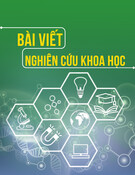


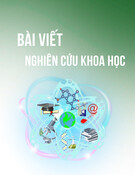


![Câu hỏi ôn tập môn Tâm lý học giáo dục [chuẩn nhất]](https://cdn.tailieu.vn/images/document/thumbnail/2025/20250710/kimphuong1001/135x160/59611752136982.jpg)
